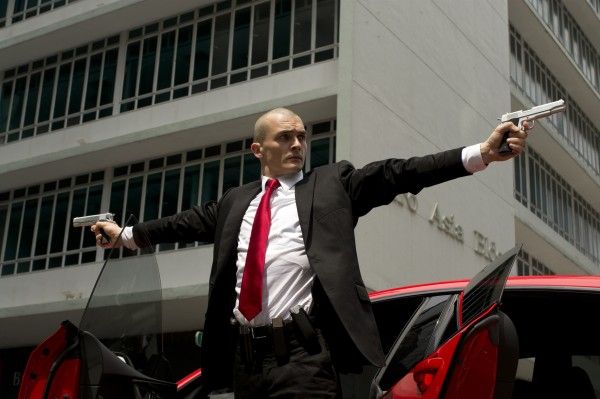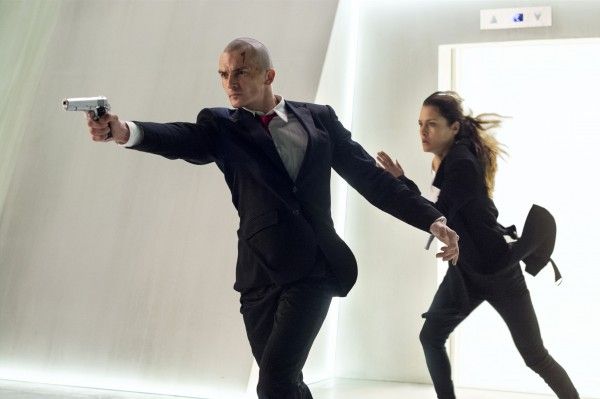Based on the popular video game franchise, Hitman: Agent 47 tells the story of an elite, genetically engineered assassin (Rupert Friend), known only by the last two digits of a barcode tattooed on the back of his neck. His latest target is a young woman, but the mission brings startling revelations about both of their pasts.
While at Comic-Con for a presentation in Hall H, Zachary Quinto spoke to press at a conference, in which he talked about how tough it was to be so close to production when Paul Walker (who was originally cast to play the title role) tragically passed away, that this is a really large-scale, high-stakes action film that’s rooted in character relationships, how none of the characters are what they seem, shooting in both Berlin and Singapore, how he prepared for this role, the most challenging stunt sequence, and how this compares to the 2007 movie. Check out what he had to say after the jump.
Question: Paul Walker was attached to this film before he tragically passed away. Were there any changes that had to be made, as a result of that?
ZACHARY QUINTO: I don’t know the answer to that question. I know that it was a really tough moment because they were pretty close to production when that really tragic thing happened. I am grateful to be a part of carrying something on, but obviously, everybody acknowledged that it was in the face of great loss.
What can you say about your character in this film?
QUINTO: It’s hard to talk about projects like this. Obviously, you want to preserve the experience for the audience, but we want to give you guys something that you can actually write about. Basically, the story is a really large-scale, high-stakes action film, which is rooted in the relationships and the dynamics between these three characters that are played by Hannah [Ware], myself and our third and most important ally in this, Rupert Friend, who plays Agent 47. He’s shooting Homeland in South Africa, which we’re all really excited to see, but it prevented him from being there with us. It’s a real triangle. Basically, Katia is searching for someone and my character, John Smith, presents himself to her, in an effort to help her find who she’s looking for. But, nothing is what it seems with these people. All of us are serving agendas that are sometimes at odds with what we are presenting. It’s tough to be more specific than that because than the experience becomes jeopardized for the audience.
What was it like to shoot in Singapore, compared to shooting in Berlin?
QUINTO: We shot the first 2/3 of the movie in Berlin, and then we moved the whole thing to Singapore for the last three weeks. We were in Berlin for about two months. You couldn’t really get more different, as far as cities are concerned, in terms of lifestyle and architecture. It was an amazing experience to be in both places and to bring them to life and to capture them as well as they did. We really used both of the cities. We’re in them, and that was the coolest part.
When something is based on a book or comic books, there is so much material, but that’s tougher with a video game. How hard was it for you to prepare to play this character?
QUINTO: The character that I play in the movie exists in the world of the video game, but in a peripheral way. For me, it wasn’t about playing the video game to understand the character. I think Rupert actually really did go into the game a little bit and explored the world through the game. He is the titular character, so it makes sense for him. But prep for any role in any movie is very different, depending on what’s required. The physical aspects of these characters became really important, in how they present themselves to the world, but what’s really going on may be something different. And then, there were all of the action sequences, so there was a lot of stunt training and prep work. It was really fun, actually. It was really challenging, but we had to throw ourselves in, headlong. It’s always a good thing, when you’re forced to do that.
What was the most challenging stunt that you had to do?
QUINTO: The most challenging stunt sequence that we have in the movie is one where there was close-range gunfire. It was interesting because we used actual guns. I was close, with a gun going off in my direction. I’ve shot guns before and been shot at, but I’ve never worked so intensely with handguns. I’m not a real big fans of handguns or weapons, in general, which is ironic, considering the type of movies I’ve done. But that, for me, was the most interesting challenge on the stunt side ‘cause I’ve never done anything like that.
How does this compare to the 2007 movie?
QUINTO: It’s eight years on, since they made that movie, and technology and cinematography have evolved, in a lot of ways. I think it’s very different, visually. There’s a scale to this movie and a dynamic to it and a sleekness to it that separates it from that previous film. But, times are different and appetites have changed and people have higher expectations for visual effects and special effects. I think that’s what this movie is based in. It’s what it’s really trying to pursue, at the same time that it’s trying to be something rooted in character and the dynamics of those relationships.
How do you approach an adaptation of something vs. a project that is entirely original?
QUINTO: My approach to that kind of thing is to just set myself free from any expectation or comparison. Ultimately, if they’re reimagining something or adapting something or evolving something beyond the point of its original concept or execution, then they’re doing that because they want to take it into a different landscape. I just try to let myself really focus on the work that’s ahead of me and what my job is and how I bring something to life. That’s a fan-based thing. That idea of comparison is what fans do. That’s why fans exist. They believe in something and something connects to them, and they have passionate feelings and opinions about stuff. I hand things over for that debate to be held among people besides me. My job isn’t to engage in that debate, so much as it is to give them something to debate about or discuss or have a reaction to.


